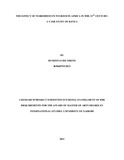| dc.description.abstract | Globalization has given terrorist networks a platform to organize, plan and orchestrate cross border or international terrorist attacks. While tourism generates loads of money in addition to promoting international cohesion, it‘s not immune from terrorism and terror attacks. The impact of terrorism on the travel and tourism industry can be enormous. It can lead to unemployment, homelessness, deflation, depression and many other social and economic ills. The contribution of tourism for many countries is so great that any downturn in the industry is a cause of major concern for many governments. The repercussions are felt in many other industries associated with tourism like airlines, hotels, restaurants and shops that cater to the tourists and allied services. Terrorism is an enigmatic and compelling phenomenon, and its relationship with tourism is complex and multifaceted. This study looks at the effect of terrorism on tourism in Africa in the 21st century: a case study of Kenya. The study focused on the following objectives; to establish the impact of terrorism on global tourism; to evaluate the effects of terrorism on local stakeholders in the tourism industry and to determine and analyze the mitigation strategies adopted by the government to deal with terror in the tourism industry. The study found that Tourism is a provider of employment and economic prosperity in many countries including Kenya, the tourism industry must be able to remain resilient in the face of adversity. Majority of the respondents indicated that their businesses were affected by terrorism which has caused a reduction of number of tourists visiting the country. It also caused unemployment due to reduced visitors which reduced the productivity of the industry. The study also found out that terrorists, do not only target tourists but will use opportunity available to attack them. With the effect of terrorism on tourism being seen, the study sought to know the mitigation strategies put in place by the government to deal with it. It was found out that despite the various counter terror strategies by the government, there was still room for improvement to rescue. Majority of the respondents suggested the government should do more to deal with terrorism and to save the tourism industry in Kenya. | en_US |

